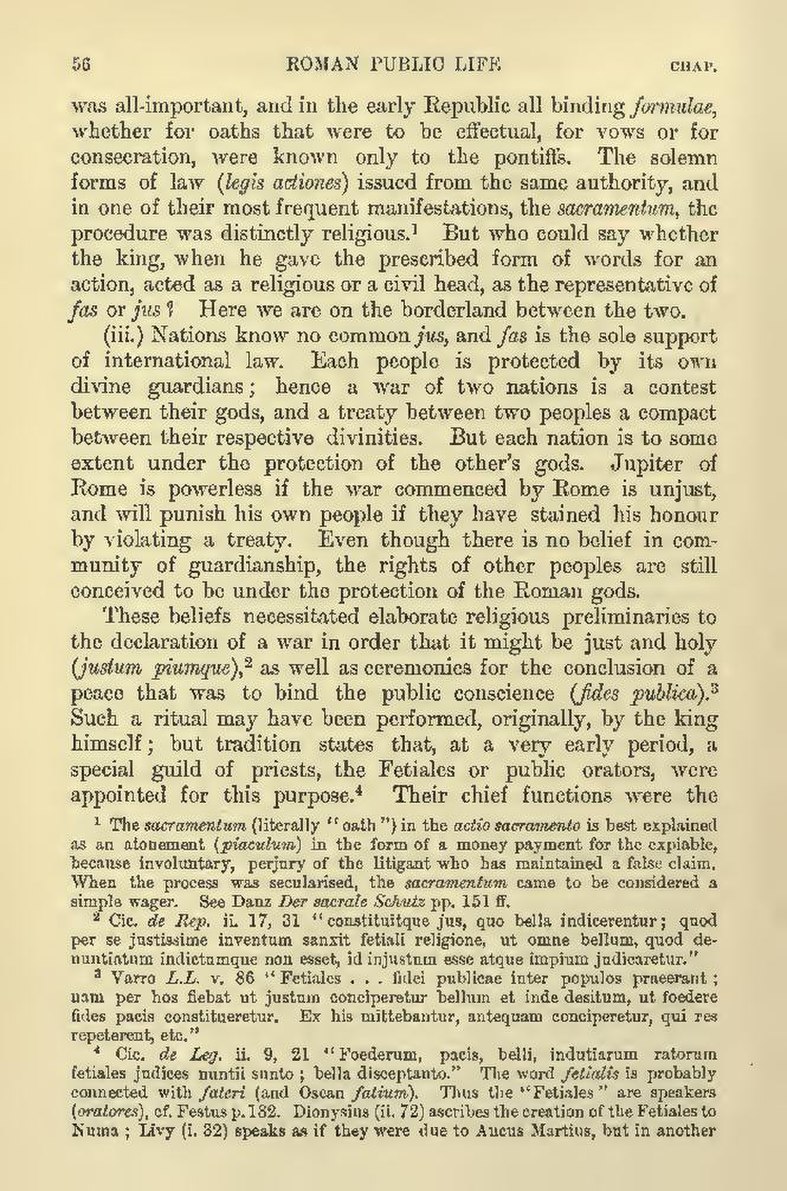was all-important, and in the early Republic all binding formulae, whether for oaths that were to be effectual, for vows or for consecration, were known only to the pontiffs. The solemn forms of law (legis actiones) issued from the same authority, and in one of their most frequent manifestations, the sacramentum, the procedure was distinctly religious.[1] But who could say whether the king, when he gave the prescribed form of words for an action, acted as a religious or a civil head, as the representative of fas or jus? Here we are on the borderland between the two.
(iii.) Nations know no common jus, and fas is the sole support of international law. Each people is protected by its own divine guardians; hence a war of two nations is a contest between their gods, and a treaty between two peoples a compact between their respective divinities. But each nation is to some extent under the protection of the other's gods. Jupiter of Rome is powerless if the war commenced by Rome is unjust, and will punish his own people if they have stained his honour by violating a treaty. Even though there is no belief in community of guardianship, the rights of other peoples are still conceived to be under the protection of the Roman gods.
These beliefs necessitated elaborate religious preliminaries to the declaration of a war in order that it might be just and holy (justum piumque),[2] as well as ceremonies for the conclusion of a peace that was to bind the public conscience (fides publica).[3] Such a ritual may have been performed, originally, by the king himself; but tradition states that, at a very early period, a special guild of priests, the Fetiales or public orators, were appointed for this purpose.[4] Their chief functions were the*
- ↑ The sacramentum (literally "oath") in the actio sacramento is best explained as an atonement (piaculum) in the form of a money payment for the expiable, because involuntary, perjury of the litigant who has maintained a false claim. When the process was secularised, the sacramentum came to be considered a simple wager. See Danz Der sacrale Schutz pp. 151 ff.
- ↑ Cic. de Rep. ii. 17, 31 "constituitque jus, quo bella indicerentur; quod per se justissime inventum sanxit fetiali religione, ut omne bellum, quod denuntiatum indictumque non esset, id injustum esse atque impium judicaretur."
- ↑ Varro L.L. v. 86 "Fetiales . . . fidei publicae inter populos praeerant; nam per hos fiebat ut justum conciperetur bellum et inde desitum, ut foedere fides pacis constitueretur. Ex his mittebantur, antequam conciperetur, qui res repeterent, etc."
- ↑ Cic. de Leg. ii. 9, 21 "Foederum, pacis, belli, indutiarum ratorum fetiales judices nuntii sunto; bella disceptanto." The word fetialis is probably connected with fateri (and Oscan fatium). Thus the "Fetiales" are speakers (oratores), cf. Festus p. 182. Dionysius (ii. 72) ascribes the creation of the Fetiales to Numa; Livy (i. 32) speaks as if they were due to Ancus Martius, but in another
